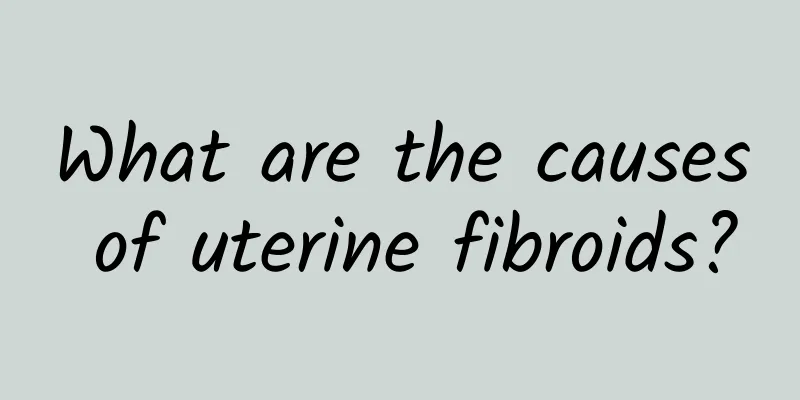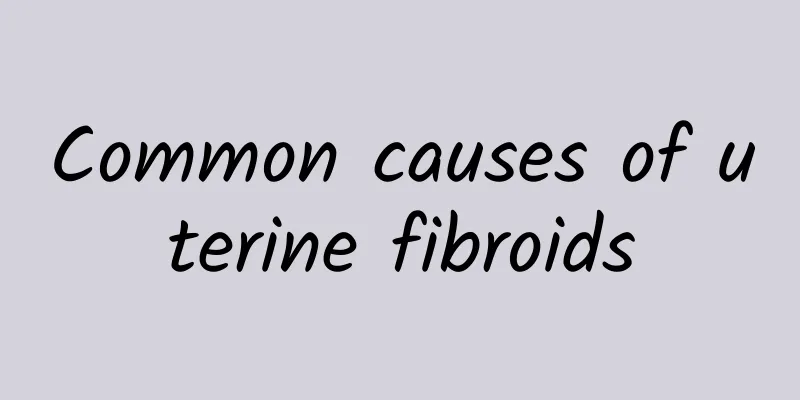What are the causes of uterine fibroids?

|
The incidence of uterine fibroids has shown a clear increasing trend recently, which has brought great pain to patients and seriously affected the patients' physical and mental health. People are also very concerned about the causes of uterine fibroids. So what are the causes of uterine fibroids? Let's take a look at the causes of uterine fibroids. The causes of uterine fibroids are as follows: 1. Histogenesis of uterine fibroids There is no consensus on the tissue origin of uterine fibroids. Some people believe that they are produced by the proliferation of immature uterine wall smooth muscle cells, while others believe that they occur in the smooth muscle tissue of the uterine vascular wall. X-linked glucose-6-phosphate dehydrogenase isoenzyme analysis found that the smooth muscle cells of different fibroids randomly distributed from the same uterus all have exactly the same G6PD electrophoresis type, which suggests that these tumors originate from a single fibroid smooth muscle cell, that is, each uterine fibroid originates from a single cell. 2. Subsequent studies have been conducted on the X chromosome, in the androgen receptor gene, containing a cloning experiment of three deoxynucleotide repeats. This locus is more polymorphic than the G6PD isozyme locus. This monoclonal experiment is consistent with the result that most fibroids are of a single origin. Therefore, it is believed that uterine fibroids are monoclonal tumors derived from a single fibroid smooth muscle cell. Multiple uterine fibroids may be multi-source monoclonal tumors formed by multifocal latent cells in the myometrium. Histological studies have found that small uterine fibroids with a short growth period are not only rich in mature smooth muscle cells containing myofibrils, but also have immature smooth muscle cells similar to those seen in the uterus of a fetus at 18 to 20 weeks of gestation. It is speculated that the occurrence of human uterine fibroids may be from undifferentiated mesenchymal cells in the uterus, which proliferate under certain pathological conditions and differentiate into smooth muscle cells to form uterine fibroids. 3. The genetics of uterine fibroids pointed out as early as the early 1990s that somatic mutations are the initiating events in the formation of fibroids. Somatic mutations include a variety of chromosomal aberrations from point mutations to chromosome loss and gain. The first is somatic mutations of monoclonal origin, which provide a selective growth advantage for mutant muscle cells. The second is the rearrangement of multiple chromosomal tumors. Cytogenetics have consistently confirmed that uterine fibroids have structural abnormalities of chromosomes. It is generally believed that 53.9% to 65.6% of uterine fibroid tissue cultures have normal karyotypes. After the above brief introduction to the causes of uterine fibroids, everyone should have some understanding that patients with uterine fibroids can be treated according to the causes of their own disease. This is conducive to the recovery of patients with uterine fibroids. If you have any questions about uterine fibroids, please consult our online experts, who will answer all your questions. Uterine fibroids http://www..com.cn/fuke/zgjl/ |
<<: What are the symptoms of uterine fibroids?
>>: What are the prevention methods for uterine fibroids
Recommend
Causes of adnexitis in women
Adnexitis is one of the gynecological diseases. K...
Female patients should understand the care methods of pelvic inflammatory disease as early as possible
According to medical evidence, pelvic inflammator...
How should patients with cervical erosion eat properly? Women with cervical erosion should keep these dietary taboos in mind
In life, the high incidence of cervical erosion a...
When will menstruation come after abortion? How many days after abortion will menstruation come normally?
When will menstruation come after an abortion is ...
What are the dangers of endometrial tuberculosis?
How much do you know about the harm of endometria...
Treatment of Haemophilus vaginitis
Haemophilus vaginitis is a vaginitis caused by in...
Clinical manifestations of bacterial vaginosis
Bacterial vaginosis is a gynecological inflammati...
Abnormal vaginal discharge? How to judge from the "color" and "quality"
When I was a child, I was brainwashed by the adve...
Yogurt, cereal, toast...Why do you feel hungrier the more you eat these foods?
I obviously eat a lot, but I always feel not full...
How to prevent tubal infertility? What are the symptoms of female tubal infertility?
Tubal infertility is caused by abnormalities in t...
Causes of uterine fibroids Dietary care methods for uterine fibroids
Uterine fibroids are a common gynecological disea...
Lose weight quickly after giving birth? 10 Diet Tips You Must Know
Most people start to gain weight after giving bir...
Analyzing common mistakes in the treatment of vaginitis
As a common female disease, most female friends a...
What is the best way to treat irregular menstruation? Is Siwu Decoction effective for irregular menstruation?
What medicine is effective for irregular menstrua...
Dysmenorrhea caused by a heavy rain
It seems that there is a lot of rain this year. M...









